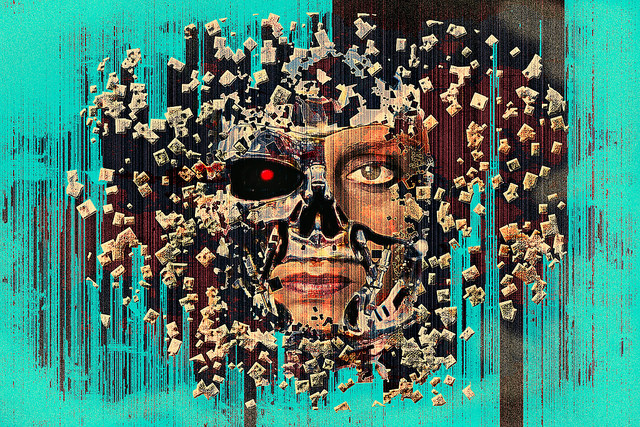
Artwork by GLAS-8.
Aboniks posted this blockbuster comment on artificial consciousness in the Cyberpunk Futurism chat group:
Pondering how the digital brain-in-a-jar might practice good mental hygiene.
You’d need a hardwired system of I/O and R/W restrictions in place to protect the core data that made up the “youness”. A “youness ROM”, perhaps. If that analogy holds up, then maybe my grandmother’s case is akin to a software overlay suddenly failing. Firmware crash. But I’m not convinced brains are so amenable to simple analogy. The processing and the storage that goes on in our heads doesn’t seem to be modular in the same sense that our digital tools are.
Anyway, if your software and hardware (however they’re arranged and designed) are capable of perfect simulation then they are equally capable of perfect deception. There may be a difference between simulation and deception, but I can’t think of a way to put it that doesn’t seem… forced.
So, for the rest of your “life”, your entire experience is UX, in the tech-bro sense of the word.
“Program or be programmed,” as Rushkoff would say. If you’re not the UX designer, you’re hopelessly vulnerable. Who are the UX designers, then? Who decides where the experience stops and the “youness” starts? Who defines that border to protect you? Another Zuckerberg running a perpetual game of three-card Monte with the privacy policy?
Maybe not an individual, but something more monolithic, ending in “SA” or “Inc”? Will there be an equivalent of Snowden or Assange to expose their profit-driven compromises in our storage facility fail-safes and leak news of government interference in the development process of our gullibility drivers?
Will we be allowed to believe them?
(Lightly edited for readability.)
She wondered where the expression “surf the net” came from. Of course Sarah knew what surfing was, but why “net”? Did it used to have something to do with catching fish?
She was fourteen and relatively popular. Her classmates though she was nice and mildly funny. Sarah knew because of the survey reports.
Harry, the troublemaker, would shoot caustic messages into their class channel. “Who surveys the surveyors?” he asked.
Finally Allison answered — Allison was more popular than Sarah, so she looked up to her — “You are so fucking boring. Get off your history kick and live in the real world, Harry. Like the rest of us. No one cares what the surveyors think. We saw them for like five minutes.”
He shot back, “You know those surveys determine your job trajectory, right?”
Allison told him she thought the test-writers knew what they were doing. Harry called her a regime sycophant. Then the teacher stepped in and reminded them that hostility was inappropriate for this venue.
Four years later, at eighteen, Sarah wondered what ended up happening to Harry. But only for a couple of minutes. Then she went back to work.




